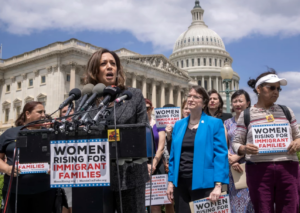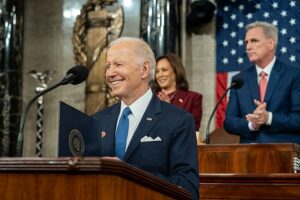On Iran’s Ambitions, Gulf States and the US Keep Passing the Buck
Much of the Middle East is facing a crisis of indecision on Iran. Despite extensive reporting on Iran’s expansionist ambitions, the Islamic Republic has been making bold demands with the expectation of both Western and Arab acquiescence.

Image Credit: Bandar Al-Jaloud/AFP via Getty Images
Much of the Middle East is facing a crisis of indecision on Iran. Despite extensive reporting on Iran’s expansionist ambitions, the Islamic Republic has been making bold demands with the expectation of both Western and Arab acquiescence. Iranian proxy footholds have long eroded the sovereignties of sectarian states. Regional tensions have further deepened due to Tehran’s insistence that a renewed nuclear agreement must preclude the ability of the International Atomic Energy Agency (IAEA) to investigate undisclosed uranium enrichment facilities. Additionally, its ballistic missile development program remains untouched.
Iraq, Syria, Lebanon, Yemen, and Gaza have become satellites for Iranian Revolutionary Guard Corps (IRGC) dominance over the course of the past two decades. Unfrozen sanctions relief via the JCPOA nuclear deal could immediately provide Iran with at least $40 billion to directly fund its hegemonic project, referred to by some as “the Shi’ite Crescent.” This realm of influence links Mesopotamia to Israel’s doorstep and flanks Saudi Arabia today. In tandem with the plausible passing of the nuclear threshold, Iran would be able to expand its influence and maintain its human rights abuses both at home and abroad, unabated. Irrespective of the JCPOA, Iran’s economy–and capabilities–are also projected to grow significantly over the next several months.
However, key Sunni allies of the region have not been silent nor immobile in light of Iran’s threats. Both the United Arab Emirates and Saudi Arabia, the helm of the Sunni world and Iran’s primary Arab adversary, have taken a number of regional actions. Their joint airstrike campaigns against the Houthis, devastating Yemen in a destructive stalemate, as well as the initial support for various rebel groups against Assad in Syria, have prevented monopolization over the region. Yet, this ‘limbo’ has generally perpetuated instability, death, and mass migration, at a severe cost to local civilians.
Moreover, the sparse effort of Iran to restrain its proxies from blatant violations of sovereignty reflects the Sunni world’s lack of preparedness and resolve to directly approach the mullahs in serious long-term negotiations or armed conflict. Gulf Cooperation Council (GCC) leaders are softening their convictions in the face of Iran’s persistence. They recently restored ties with Qatar, a major patron and host of Iranian proxy leaders, as well as with Syria. In other words, there are currently few repercussions presented to curb Iran’s expansionist operations.
Despite President Biden’s joint declaration with Israeli Prime Minister Yair Lapid in July proclaiming the unwavering policy of preventing Iran from obtaining a nuclear weapon, there has yet to be a similar declaration between the US and its conservative monarchic allies in the Gulf. We can attribute this to both US disengagement from the region at large and pre-existing Gulf Arab hesitation and ill-preparedness to directly address Iran.
Almost two years since the historic Abraham Accords, which saw an unprecedented “warm peace” formalize between Israel and four Arab states, one of the latest signs of Gulf retreat from coordinated action occurred that same July at the Jeddah Summit. During the Summit, US, GCC, and Arab League leaders came together to affirm their common vision for regional security and prosperity. Rumors arose of a US-led discussion on the prospects of a US-Arab-Israel “NATO” alliance to contain Iran. As soon as journalists got a hold of this alleged agenda item, every attending state denied and firmly rejected the very idea of such an endeavor. Jordan had been the sole exception the month prior, but it too was successfully pressured to walk its remarks back.
One explanation for this anxious ambivalence is the GCC’s minimal military cohesion. There have been few Gulf efforts to conduct regional military drills against a potential extensive Iranian attack–possibly out of fear that it would inflame the Ayatollah’s fears and catalyze a drastic response. This issue is also defined by a cyclical mitigation of missile strikes on Sunni oil reserves by Iranian proxies with Saudi and Emirati reprisals–a failing game of “whack-a-mole” that evades confronting Tehran directly.
Saudi Arabia still lacks sufficient military experience, training, and adept personnel–even with its robust military hardware. This is only exacerbated by Congress’s reluctance to aid an ally that continues repression and human rights violations, despite Crown Prince Mohammed bin Salman’s recent societal and gender reforms. If there are any talks or pursuits of regional Arab-Israeli or GCC military coordination, they are still in the lukewarm stage, ‘unofficial’, or kept highly classified.
On the other hand, a Middle East NATO might be perceived as a drain on the capabilities of other member states struggling to remain afloat themselves. Saudi Arabia, with its proven intervention in places like Bahrain and Lebanon to counter Iranian influence, knows that collective security means its own security. However, why would MBS, let alone any Middle Eastern monarch, want to be beholden militarily and economically to every neighbor?
On the nuclear issue, Riyadh’s concerns may rest primarily on the potential of an unbreakable Iranian hegemony secured by the bomb–not in the sheer chance that it becomes a target of a nuclear warhead. Possessing the largest territory of any Arab state in the region and a decently-sized population, the threat of a nuclear attack is not existential to the Kingdom, unlike how it is to Israel. Nuclear proliferation is also not in Riyadh’s interests, but passing the buck to the US or Israel to take on Iran’s aggression remains the most likely outcome of current events.
With its own conflicted vision post-withdrawal from Afghanistan, the US will continue to flirt with monetary alternatives, including a feeble JCPOA, to boost regional capabilities without serious commitments on the ground. But Biden’s Obama-era approach risks a strategic trap. It incentivizes brinkmanship by financing all sides, without calculating its breaking point in the Middle East lacking a US presence.
There is no “bipolar” or “multipolar deterrence” that can be built up in a region already dilapidated by domestic instability and foreign distrust. A loose cash flow to both Iran and Saudi Arabia, as well as Israel, will not lessen the chance of a regional war. Rather, if Iran’s stated ambitions and enhanced capabilities demand that it wage war, a lack of a united Gulf strategy and tangible US commitments will hasten it.
Justin Feldman (he/him) is a second-year MA student in International Relations at NYU. He graduated from the University of California, Los Angeles in 2020 with a BA in International Relations and Middle Eastern Studies. With experience in the nonprofit and research sectors, Justin has led various inter-ethnic and interfaith initiatives, connecting Middle Eastern consular diplomats and entrepreneurs with grassroots leaders in the U.S. His primary research and travel focus on multipolarity, nationalist threats, and opportunities for ethno-religious diversity in the Middle East and North Africa. When he’s not immersed in current events and history, Justin enjoys cooking, binge-watching Marvel series, creating Hebrew and Arabic calligraphy, and hiking.







